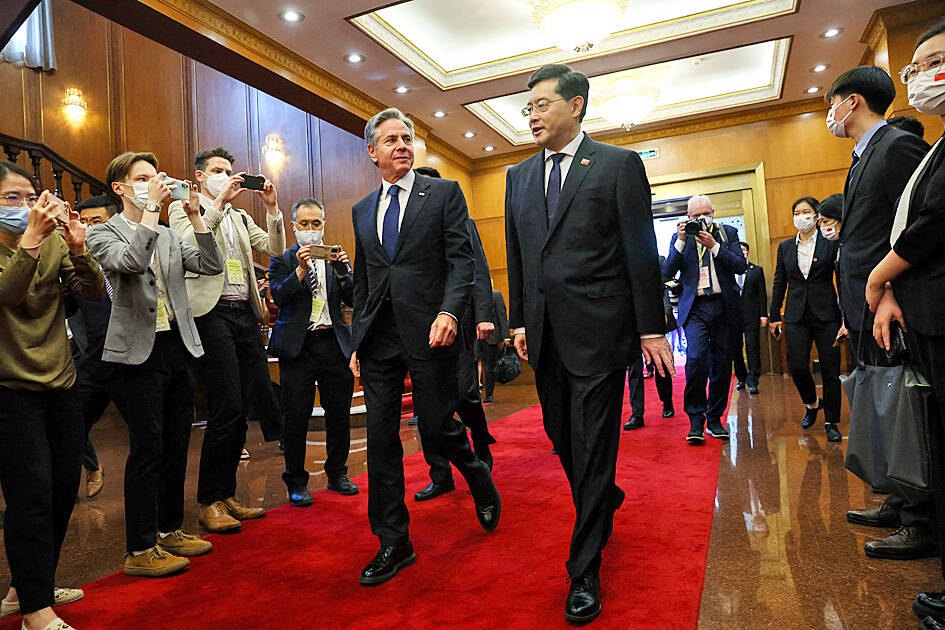US Secretary of State Antony Blinken yesterday started two days of high-stakes diplomatic talks in Beijing aimed at trying to cool exploding US-China tensions that have set many around the world on edge.
Blinken opened his program by meeting Chinese Minister of Foreign Affairs Qin Gang (秦剛) for an extended discussion to be followed by a working dinner.
He is to have additional talks with Qin, as well as Chinese Central Foreign Affairs Commission Director Wang Yi (王毅) and possibly Chinese President Xi Jinping (習近平) today.

Photo: AFP
Neither Blinken nor Qin made any substantive comments to reporters as they began the meeting at the Diaoyutai State Guesthouse.
Despite Blinken’s presence in the Chinese capital, prospects for any significant breakthroughs are slim, as animosity and recriminations have steadily escalated over a series of disagreements that have implications for global security and stability.
Blinken is the highest-level US official to visit China since US President Joe Biden took office and the first secretary of state to make the trip in five years.
Biden and Xi agreed to Blinken’s trip early at a meeting last year in Bali, Indonesia. It came within a day of happening in February, but was delayed by the diplomatic and political tumult brought on by the discovery of what the US says was a Chinese spy balloon flying across the US that was shot down.
Biden on Saturday played down the balloon episode as Blinken was heading to China.
“I don’t think the leadership knew where it was and knew what was in it and knew what was going on,” he told reporters.
“I think it was more embarrassing than it was intentional,” he added.
Biden said he hoped to again meet Xi after their lengthy and strikingly cordial meeting in Bali.
“I’m hoping that, over the next several months, I’ll be meeting with Xi again and talking about legitimate differences we have, but also how there’s areas we can get along,” Biden said.
The list of disagreements and potential conflict points is long, ranging from trade with Taiwan, human rights conditions in China and Hong Kong, to Chinese military assertiveness in the South China Sea and Russia’s war in Ukraine.
Xi offered a hint of a possible willingness to reduce tensions, saying in a meeting with Microsoft Corp cofounder Bill Gates on Friday that the US and China can cooperate to “benefit our two countries.”
“I believe that the foundation of Sino-US relations lies in the people,” Xi told Gates. “Under the current world situation, we can carry out various activities that benefit our two countries, the people of our countries, and the entire human race.”
Additional reporting by AFP

NATIONAL SECURITY THREAT: An official said that Guan Guan’s comments had gone beyond the threshold of free speech, as she advocated for the destruction of the ROC China-born media influencer Guan Guan’s (關關) residency permit has been revoked for repeatedly posting pro-China content that threatens national security, the National Immigration Agency said yesterday. Guan Guan has said many controversial things in her videos posted to Douyin (抖音), including “the red flag will soon be painted all over Taiwan” and “Taiwan is an inseparable part of China,” while expressing hope for expedited “reunification.” The agency received multiple reports alleging that Guan Guan had advocated for armed reunification last year. After investigating, the agency last month issued a notice requiring her to appear and account for her actions. Guan Guan appeared as required,

A Vietnamese migrant worker yesterday won NT$12 million (US$379,627) on a Lunar New Year scratch card in Kaohsiung as part of Taiwan Lottery Co’s (台灣彩券) “NT$12 Million Grand Fortune” (1200萬大吉利) game. The man was the first top-prize winner of the new game launched on Jan. 6 to mark the Lunar New Year. Three Vietnamese migrant workers visited a Taiwan Lottery shop on Xinyue Street in Kaohsiung’s Gangshan District (崗山), a store representative said. The player bought multiple tickets and, after winning nothing, held the final lottery ticket in one hand and rubbed the store’s statue of the Maitreya Buddha’s belly with the other,

‘NATO-PLUS’: ‘Our strategic partners in the Indo-Pacific are facing increasing aggression by the Chinese Communist Party,’ US Representative Rob Wittman said The US House of Representatives on Monday released its version of the Consolidated Appropriations Act, which includes US$1.15 billion to support security cooperation with Taiwan. The omnibus act, covering US$1.2 trillion of spending, allocates US$1 billion for the Taiwan Security Cooperation Initiative, as well as US$150 million for the replacement of defense articles and reimbursement of defense services provided to Taiwan. The fund allocations were based on the US National Defense Authorization Act for fiscal 2026 that was passed by the US Congress last month and authorized up to US$1 billion to the US Defense Security Cooperation Agency in support of the

CLASSIFIED BRIEFING: The ministry said the special budget focuses on building a comprehensive defense system and strengthening the domestic defense industry The Ministry of National Defense yesterday released information on seven categories of weapons systems to be procured under a stalled NT$1.25 trillion (US$39.57 billion) special defense budget, including precision artillery, long-range missiles, air defense anti-tank missiles and more than 200,000 uncrewed aerial vehicles (UAVs). The Executive Yuan approved a draft version of the budget on Nov. 27 last year and submitted it to the legislature for review. The legislature’s Foreign Affairs and National Defense Committee yesterday invited Minister of National Defense Wellington Koo (顧立雄) to deliver a classified briefing and answer questions at a closed-door session. Koo said he hoped to provide lawmakers